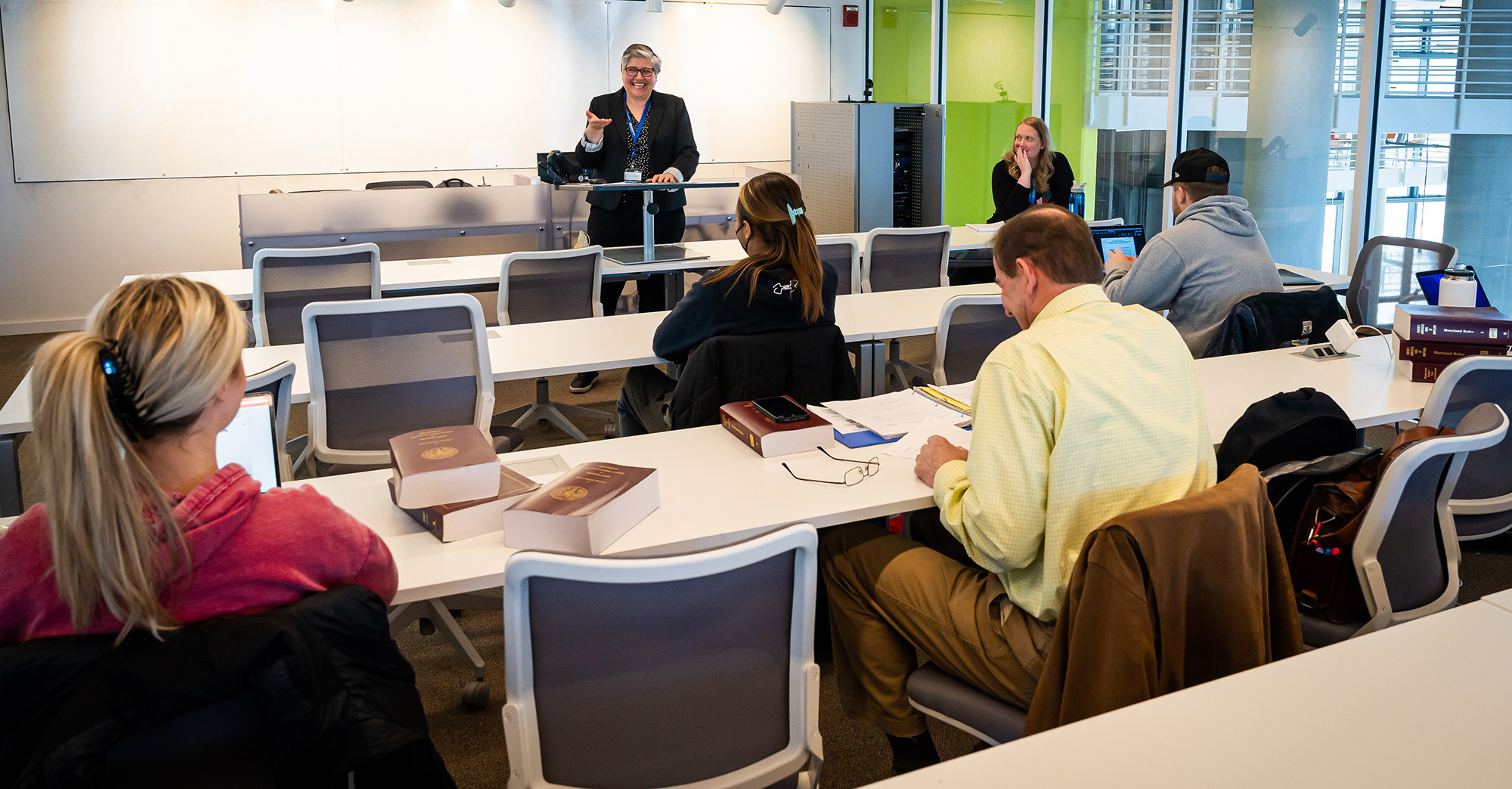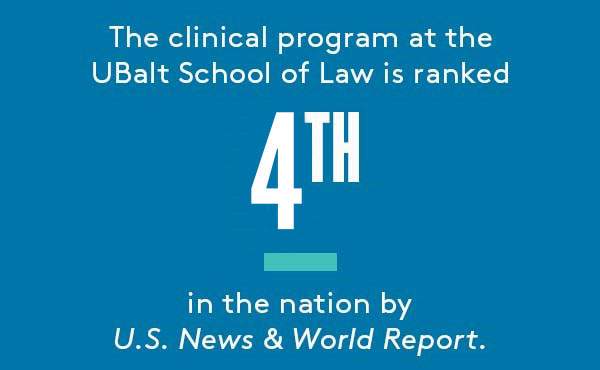

Under Maryland Rule 19-220, University of Baltimore clinic students represent clients with the supervision of our world-class clinical faculty. When you enroll in the clinical program, you'll learn to be a lawyer in a way you couldn't through classroom work alone. You will meet with clients, research their cases, advocate on their behalf and plan how best to meet their legal needs.
![]()
The Bob Parsons Veterans Advocacy Clinic students help veterans obtain benefits and assist them with other service-related
legal needs. You will develop essential lawyering skills through direct representation,
community outreach projects and legislative advocacy.
Recent accomplishments: Student-attorneys continued to advocate for more Veterans
Treatment Courts in Maryland. Additionally, students represented veterans in VA benefits
appeals, focusing on veterans with mental health issues. In one case, a veteran with
severe depression was discharged after attempting suicide. Student-attorneys drafted
a petition to upgrade her discharge from General to Honorable, which the Navy granted,
making her eligible for educational benefits.
Bronfein Family Law Clinic students learn multidimensional lawyering through litigation, legislative advocacy
and community-based projects. You will represent clients in court seeking civil-protection
orders in cases of domestic violence and family law orders, including divorce, child
custody, child adoption, child support and name changes.
Recent accomplishments: Clinic student-attorneys represented low-income clients in
civil domestic violence cases and in complex divorce, child-custody, child-support
and paternity cases as well as in Special Immigrant Juvenile Status cases. The student-attorneys
conducted trials and hearings, drafted motions and complaints, and conducted innumerable
interviews and legal counseling sessions. Working with the Reproductive Justice Inside
coalition, they researched and wrote a model policy on reproductive health care and
menstrual products for Maryland’s correctional facilities.
The Community Development Clinic provides a wide variety of transactional legal services to and advocacy for historically
underserved communities in Baltimore. You will provide legal representation to community
associations, nonprofit organizations and small-business owners on matters including
business formation, operations and financing, land use and real estate acquisition.
Recent accomplishments: Student-attorneys assisted an urban farming nonprofit in revising
its bylaws and establishing employment policies, advised an educational entrepreneur
about small business formation options, and helped a disaster relief organization
comply with benefit organization laws. To create systemic change, student-attorneys
provided legal and policy support to community residents affected by Baltimore’s water
crisis; this effort led to legislation adjusting water fees for the poor. Student-attorneys
prepared and presented “know your rights” materials to community organizations and
provided pro bono legal advice to prevent tax sales in collaboration with local legal
aid organizations.
In the Criminal Defense and Advocacy Clinic (CDAC), student-attorneys directly represent individuals charged with criminal offenses
in Baltimore City, develop the skills to practice in a criminal law or trial advocacy
setting, and gain a broad perspective on systemic issues in the criminal legal system.
Student-attorneys handle all aspects of the client’s case, from client interviews
and counseling to plea negotiation to oral arguments and cross-examination. Student-attorneys
also have opportunities to work on broader, systemic issues through projects, litigation,
and legislative advocacy.
Recent accomplishments: Student-attorneys’ advocacy resulted in not guilty verdicts
in several cases and negotiated favorable pleas in others. During bail review hearings,
student-attorneys fought for and secured the release of individuals from pretrial
incarceration. Additionally, some student-attorneys wrote testimony in support of
a bill in the Maryland Legislature, which ultimately passed both chambers.
The Immigrant Justice Clinic is a three-credit, one-semester course (offered in the Spring semester only) in which
students have the opportunity to learn multiple dimensions of lawyering by engaging
in direct client representation under faculty supervision. Students will represent
clinic clients in an affirmative application to the Department of Homeland Security.
This is not a litigation clinic.
Immigrant Rights Clinic student-attorneys represent low-income immigrants in Immigration Court, in Maryland
Circuit Court and before the U.S. Department of Homeland Security’s Citizenship and
Immigration Services. Caseloads are as diverse as the clinic’s clients. During your
clinical experience, you will touch on many areas of immigration practice—asylum law,
family reunification, detention, naturalization and more—while representing clients
from all over the world.
Recent accomplishments: Clinic student-attorneys represented asylum-seekers from Central
America who had fled gang violence, domestic violence, or a combination of both. Some
clients were families who had been separated and detained at the border. Other clients
came from East Africa, Southeast Asia and the Middle East. Student-attorneys interviewed
clients and witnesses; counseled clients on everything from case strategies to collateral
issues; gathered evidence to prove their clients’ claims; addressed family members’
immigration options; and argued the cases in legal briefs at the asylum office and
in court.
Innocence Project Clinic students learn client-centered lawyering, primarily through investigation and litigation.
You will represent clients claiming factual innocence and will be involved in client,
witness, fact and paper investigation; draft motions and briefs; and negotiate and
argue in trial courts throughout Maryland.
Recent accomplishments: Clinic student-attorneys investigated more than 20 cases of
factual innocence, filed multiple DNA testing petitions in Maryland Circuit Courts
and presented two cases of factual innocence to the Baltimore City State’s Attorney
Conviction Integrity Unit (CIU). In December 2018 and again in May 2019, the clinic,
in connection with the CIU, secured the exoneration of clients who had spent 27 and
24 years, respectively, in prison for crimes they did not commit.
Students in the Legal Data & Design Clinic engage in “digital advocacy,” applying technology and principles of data and design to solve real-world legal problems. Clinic students represent organizational clients and use innovative tools to assist in client litigation, lobbying, law reform, and public education. Clinic students will gain expertise in the use of spreadsheets, pivot tables, SQL databases, visualizations, coding, APIs and more, in order to design applications, create websites, and produce detailed and evidence-informed legal memoranda and briefs.
Although hard technical skills are taught, no specific prior technical experience is required. Substantively, the clinic focuses on the criminal justice domain, and students will learn about, and participate in, criminal justice reform in Maryland. The clinic maintains a course website.